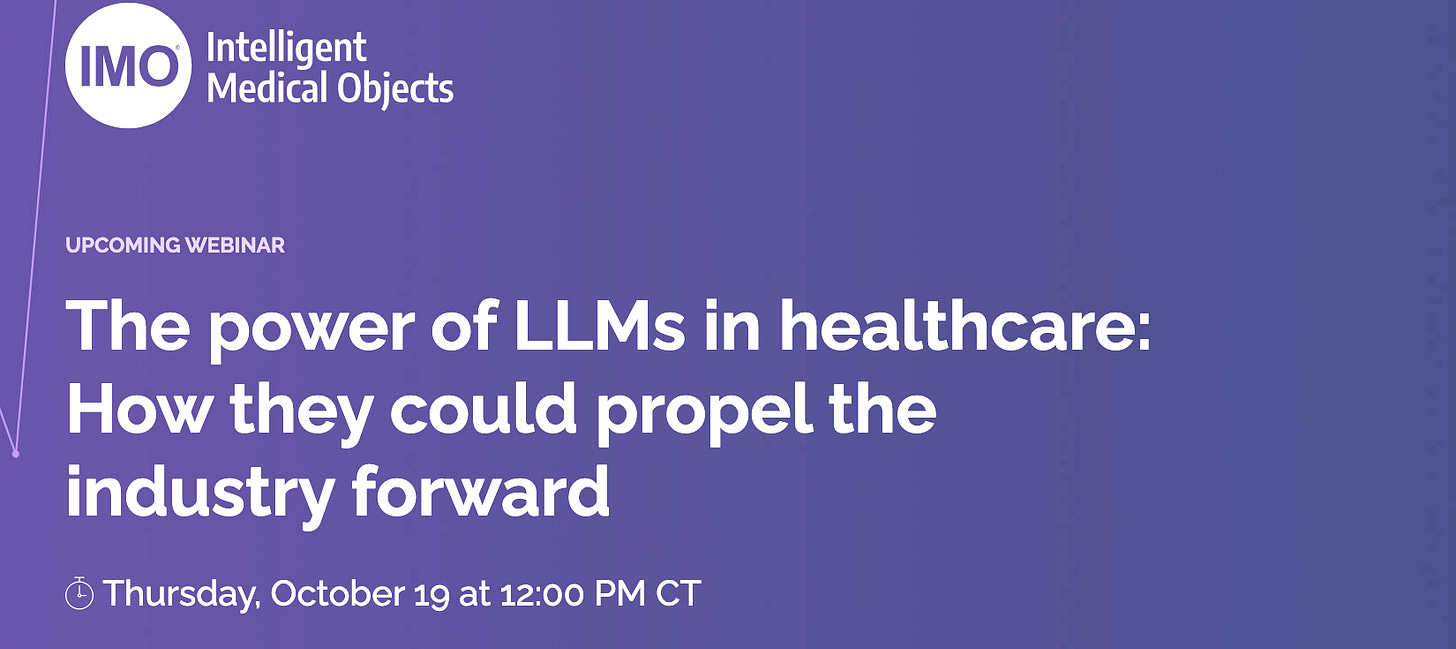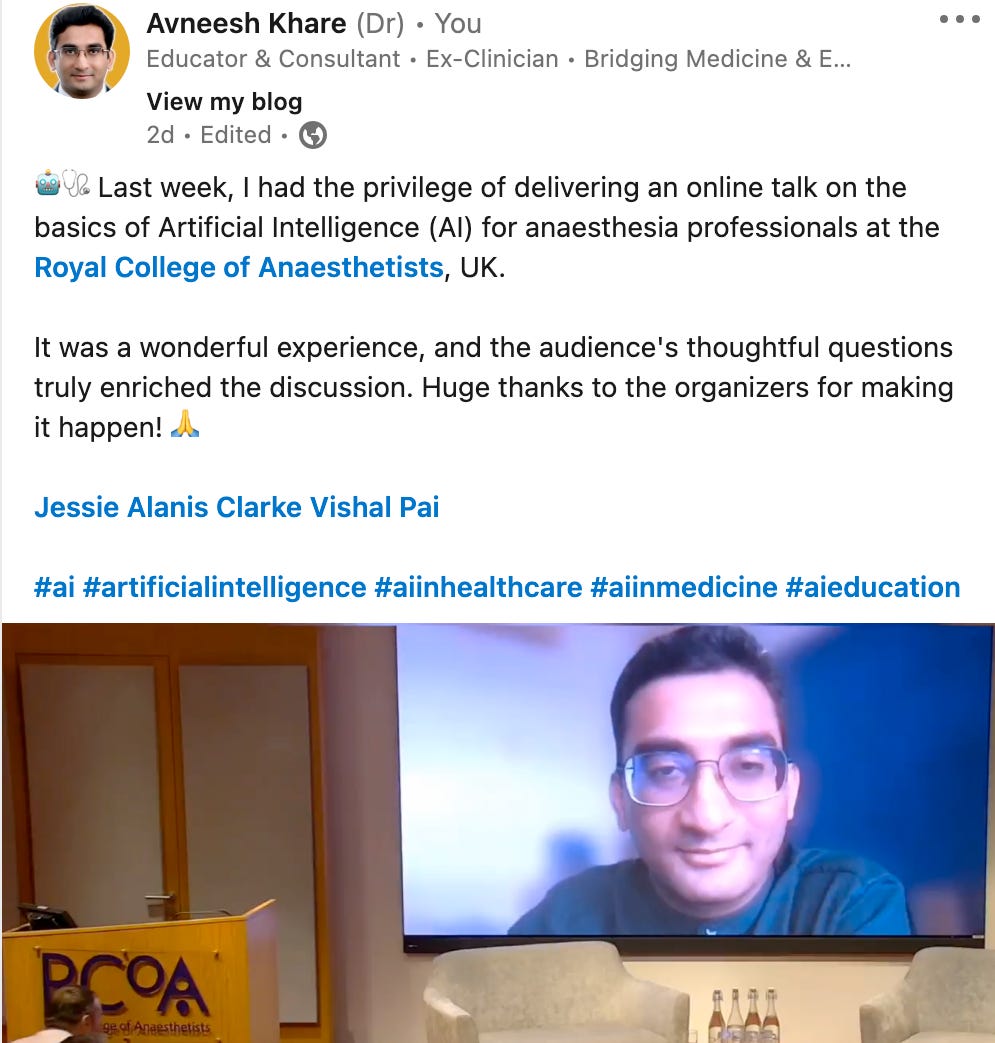🌟 AI Advancements in Medicine: Rapid Tuberculosis Detection, Voice-Based Heart Failure Monitoring, Cognitive Autism Screening, and More 🏥🔍
Weekly Updates on AI in Medicine 🤖🩺🚀
"Some people call this artificial intelligence, but the reality is this technology will enhance us. So instead of artificial intelligence, I think we'll augment our intelligence." - Ginni Rometty, CEO of IBM
Dear Med AI Enthusiast,
Welcome to this edition of The ‘Med AI’ Capsule Weekly Newsletter! ⚕️🤖💊 I'm really excited to have you with me as we dive into the fascinating world of Medical AI.
In this newsletter, I'll be your guide, taking you through the latest news updates and thought-provoking ideas in the ever-changing field of artificial intelligence in medicine.
Whether you're an interested medical professional, a tech enthusiast, or just curious about the future of medicine, The ‘Med AI’ Capsule is here to lead the way and show you the exciting possibilities and cautionary areas for AI in medicine.
So, get ready for an adventure, and let's explore this thrilling journey together! 🚀
In today’s capsule:
5 Med AI News Updates
3 Med AI Research Updates
2 Med AI Events
1 Med AI Work Opportunity
Social Post of the Week
Reading Time: 5-7 minutes
Med AI News Updates 📰
🔍 AI-Powered ‘Genki’ Detects Tuberculosis in Seconds 🤖
Why Important: Tuberculosis remains a major global health concern, especially in underserved regions. DeepTek's Genki, an AI-based mobile tool, utilizes digital chest radiographs to swiftly detect TB, enhancing early treatment initiation and potentially curbing the disease's spread.
Caution: Despite its potential benefits, Genki's use for TB detection will have to overcome challenges related to diagnostic confirmation, data privacy, regulatory compliance, overreliance on technology, etc.
👂 AI Voice Biomarker Revolutionizes Heart Failure Monitoring 🤖
Why Important: Optimum management of heart failure is crucial for patients' well-being. The HearO™ app, powered by AI voice biomarkers, enables early symptom detection and optimization of treatment plans, potentially reducing hospitalizations and improving patients' quality of life.
Caution: While the app shows promise, concerns include accuracy, privacy, clinical validation, etc. which need careful consideration for successful adoption.
🧒 AI-Enabled App Enhances Screening for Autism ⏱️
Why Important: Early detection of autism is vital for effective intervention. Duke University's AI-powered tablet app, SenseToKnow, offers a quick and accurate ten-minute screening for autism in children, potentially reducing disparities in diagnosis and improving outcomes.
Caution: Further research is needed to ensure its effectiveness and reliability in augmenting existing diagnostic methods, especially in diverse populations.
🏥 AI Enhances Accuracy of X-ray Diagnosis by Combining Imaging and Patient Data 🤖
Why Important: Chest X-ray diagnosis is a critical aspect of healthcare. A new AI model, utilizing transformer-based neural networks, seamlessly integrates imaging and non-imaging patient data to improve diagnostic accuracy, potentially aiding clinicians in managing increasing workloads and enhancing patient care.
Caution: The AI model has potential benefits, but it also faces challenges like data privacy, reliability, and ensuring doctors still play a vital role in patient care.
🧠 AI Shows Promise in Early Dementia Detection 🤖
Why Important: Dementia is a growing concern with significant diagnostic challenges. An 18-month study demonstrates that AI tools, specifically a Passive Digital Marker (PDM) algorithm, can reliably predict dementia and cognitive impairment, offering the possibility of early intervention and improved care.
Caution: While this study is promising, further research and real-time application are necessary to fully realize the potential of AI in management of dementia.
Med AI Industry Showcase 📢
Wysa is an AI chatbot designed for mental health support.
Wysa offers anonymous, real-time conversational AI assistance for individuals and employees dealing with stress, anxiety, and depression.
Their research in the USA and UK revealed that many employees face mental health challenges, but only a small percentage seek help, mainly due to stigma.
Wysa claims its chatbot can alleviate symptoms, prevent escalation, and reduce costs by handling 80% of support needs.
They provide curated cognitive-behavioral therapy programs, self-care exercises, and even human coaching and therapy options.
Wysa has formed partnerships, including one with Travelers, a major workers' compensation insurer in the US, and has obtained FDA certification.
It's also recognized as a top digital health startup by CB Insights.
If you want your ‘MED AI’ company/ startup/ product to be featured here, please feel free to reach out to me at avneeshkhareonline@gmail.com.
Med AI Research Updates 🔬
🏥 Autonomous AI Boosts Clinic Productivity, Offering Hope for Improved Healthcare Efficiency 🤖
📊 In a cluster-randomized trial, an FDA-authorized AI system for diabetic eye exams outperformed the control group, leading to a 40% higher productivity rate (1.59 encounters/hour vs. 1.14 encounters/hour).
⚠️ While these findings are promising, further research and implementation are needed to fully understand and maximize benefits of autonomous AI in healthcare.
✨ Major Expectations: Participants anticipate improved hospital administration, enhanced care quality, better patient experiences, and reduced costs and disparities.
❗ Key Concerns: Worries revolve around potential negative changes in healthcare, loss of patient autonomy, accountability issues, data management risks, and the emergence of new disparities.
🤝 The study emphasizes the importance of involving patients and the public in discussions and decisions regarding AI's role in healthcare.
📊 AI Helps Bridge the Gap by Enhancing Patient Comprehension of Radiology Reports 🤖
🏥 Diagnostic imaging reports are often complex and difficult for patients to understand.
💡 Artificial intelligence, particularly large language models, holds promise in simplifying these reports to improve patient comprehension, but more research is needed before widespread implementation.
Med AI Events 🧑💻
Med AI Work Opportunity 💼
Social Post of the Week 📲
Let’s wrap it up with a fun fact!
In 2019, IBM AI machine called Debater lost to a top-ranked human debater, Harish Natarajan.
Stay tuned for our upcoming editions as we explore the latest breakthroughs and dive deep into AI's transformative power, shaping a healthier future.
Warm regards,
P.S.: If you're a medical professional intrigued by artificial intelligence, but not sure where to start, feel free to reach out to me for personalised guidance HERE.
You can also check out my CPD-accredited ‘Med AI’ course on the Bionabu (UK) platform and join our vibrant Med AI WhatsApp Community.
Follow me on LinkedIn and Twitter
Voluntary Disclosure: Generative AI tools were employed to help me in making this newsletter better for you.









